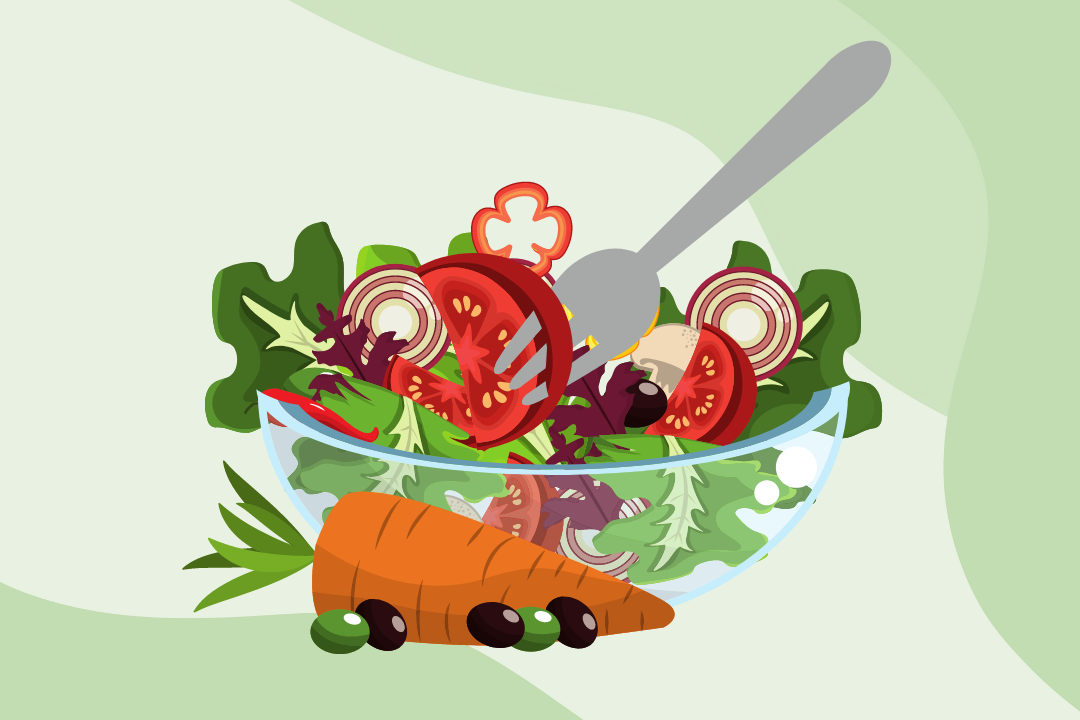The vegetarian lifestyle has gained considerable attention in recent years as more people discover the numerous benefits of a vegetarian diet.
A plant-based diet improves your health, promotes animal welfare, and reduces your environmental footprint.
Suppose you’re considering the shift or have recently made the change. In that case, this ultimate guide will help you thrive on a vegetarian diet by providing essential insights and valuable tips.
What is a Vegetarian Diet?
A vegetarian diet excludes meat, poultry, and seafood. There are several types of vegetarianism, each with its unique set of guidelines:

** Not strictly vegetarian, often considered a stepping-stone to a fully vegetarian diet
Nutritional Considerations for a Vegetarian Diet
Protein
One of the primary concerns for vegetarians is getting enough protein. Proper planning makes it easy to meet your daily protein needs with plant-based sources. Some excellent vegetarian protein options include:
- Legumes (beans, lentils, chickpeas)
- Nuts and seeds (almonds, chia seeds, pumpkin seeds)
- Whole grains (quinoa, barley, whole wheat bread)
- Dairy products (yoghurt, cheese, milk)
- Eggs (for lacto-ovo vegetarians)
- Meat alternatives (tofu, tempeh, seitan)
Iron
Iron is another nutrient that requires attention in a vegetarian diet. Plant-based iron sources are less easily absorbed by the body than animal sources. To enhance absorption, pair iron-rich foods with vitamin C-rich foods. Vegetarian iron sources include:
- Dark leafy greens (spinach, kale, Swiss chard)
- Legumes (lentils, chickpeas, kidney beans)
- Fortified cereals and bread
- Dried fruits (raisins, apricots, dates)
- Seeds (pumpkin, sunflower, sesame)
Vitamin B12
Vitamin B12 is primarily found in animal products, so vegetarians need to be mindful of their intake. Fortified foods and supplements are the most reliable sources of B12 for vegetarians. Consider incorporating these into your diet:
- Fortified plant-based milk (soy, almond, oat)
- Fortified breakfast cereals
- Nutritional yeast
- B12 supplements
Calcium
While dairy products are an excellent source of calcium, non-dairy sources are also available for those who avoid dairy. Calcium-rich plant-based foods include:
- Leafy greens (bok choy, collard greens, kale)
- Calcium-set tofu
- Fortified plant-based milk
- Almonds and sesame seeds
Omega-3 Fatty Acids
Omega-3 fatty acids are essential for brain health and heart health. While fish is a common source, vegetarians can also find omega-3s in plant-based foods, such as:
- Flaxseeds and flaxseed oil
- Chia seeds
- Walnuts
- Algae-based supplements
Building a Balanced Vegetarian Meal
A balanced vegetarian meal should include a variety of foods to ensure you’re meeting your nutritional needs. Here are some tips for constructing a nutritious and satisfying plant-powered plate:
Fill Half Your Plate with Vegetables
Incorporate a colourful array of vegetables to benefit from their vitamins, minerals, and antioxidants. Opt for dark, leafy greens, cruciferous vegetables (like broccoli and cauliflower), and other colourful options like bell peppers, tomatoes, and carrots.
Include a Source of Protein
To stay full and satisfied, incorporate a protein source into every meal. Choose from legumes, whole grains, dairy products, eggs, or meat alternatives, depending on your preferences and dietary restrictions.
Add a Serving of Whole Grains
Whole grains provide essential nutrients and fibre, which can help maintain healthy digestion and weight. Opt for whole grains like brown rice, quinoa, whole wheat pasta, or whole grain bread.
Don’t Forget Healthy Fats
Healthy fats are essential for brain health, hormone production, and nutrient absorption. Include sources of healthy fats such as avocados, nuts, seeds, and olive oil in your meals.
Meal Planning and Preparation Tips for a Vegetarian Diet
Planning your meals ahead of time can help ensure you’re meeting your nutritional needs and make your life easier. Here are some strategies for successful vegetarian meal planning and preparation:
Create a Weekly Meal Plan
Spend some time each week planning your meals and grocery list. This will help you stay organized, save time, and reduce food waste.
Build a Recipe Collection
Compile a collection of go-to vegetarian recipes to make meal planning easier. Explore new recipes to keep your meals exciting and prevent boredom.
Prep Ingredients in Advance
When you have time, prepare ingredients for the week ahead. For example, chop vegetables, cook grains, or make sauces and dressings to streamline meal preparation during busy weekdays.
Embrace Batch Cooking
Cooking large meals or meal components can save time and make sticking to a vegetarian diet easier. Freeze leftovers in portions for convenient meals when you’re short on time.
The Bottom Line
Adopting a vegetarian lifestyle opens possibilities for your health, the environment, and animal welfare.
By understanding the various types of vegetarianism, meeting your nutritional needs, and mastering the art of creating balanced, satisfying meals, you’ll be well-equipped to thrive on a plant-powered diet. With this ultimate guide, you can confidently navigate your vegetarian journey and discover the joy of vibrant, delicious, and sustainable eating.
Welcome to the green revolution!
